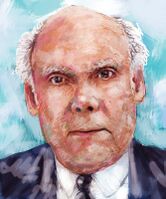| bio
|
Kamaleswar Bhattacharya (born on August 29, 1928, died March 16, 2014) is a French Indianist and Sanskritist of Indian origin.
Kamaleswar Bhattacharya was born in August 1928 in a small village north of Dhaka, capital of present-day Bangladesh, he was educated in Calcutta, Paris and at the Sanskrit University of Varanasi. In September 1955, with a French government academic group, he came to France to work in the Indology sector. In February 1962 he obtained a doctorate of letters (State doctorate) with the "very honorable mention". Domiciled in France in Brunoy, he died on March 16, 2014 in Dhaka.
Area of advanced research
His two important researches, Brahmanic religions in ancient Cambodia, according to Epigraphy and Iconography (1961) and Researches on the Vocabulary of Sanskrit Inscriptions of Cambodia (1964-1991), are considered by scholars of the sector as classics and exemplars of Khmerology. He checked and corrected for the editions the translations of the Cambodian Sanskrit inscriptions of Auguste Barth, Abel Bergaigne, Louis Finot and George Coedès, great French Sanskritists. He is one of the few scholars with acquired knowledge for such a difficult mission.
Great specialist in Buddhism
After receiving his state doctorate, he turned to more classical branches of Indology, in particular philosophy. His long association with Louis Renou (1956 - 1966) formed his philological point of view and guided all his research. His book The Ātman - Brahman in Ancient Buddhism (1973), based on extensive studies of the Pali Canon and Sanskrit sources, is the result of his extensive research on Cambodia. And then he touched on late Buddhist philosophy including Madhyamaka philosophy and some aspects of Buddhist epistemology. His translation of Vigrahavyāvartanī with annotations and his articles on the grammatical elements of Nāgārjuna's thought can serve as models for scholars of future generations.
Rare logician of modern times
For the past forty years he has published extensively on various aspects of Indian thought: philosophy, logic, semantics and poetry. He has amply completed his annotated translation concerning the Navya-Nyāya (New Logic), the Siddhañta lakṣaṇa prakaraṇa of the Tattvacintāmaṇi of Gangesa with the Dīdhiti of Raghunātha Śiromaṇi and the Țīkā of Jagadīśa Tarkālamkāra. He also published his edition of the Tattvacintāmaṇiprabhā (Anumānakhaṇḍa) of the Yajñapati Upādhyāya. This is the first commentary of the well-known Tattvacintāmaṇi. In his research on the texts, he emphasized the close relationship between the science of grammar and philosophical thought in India.
Distinguished researcher and professor
During his career, he held important chairs and received honorary awards. Thanks to the support of Louis Renou, he entered in 1960 as a research associate at the National Center for Scientific Research in Paris where he retired in September 1996 to the rank of first-class research director. During this period he also taught as a visiting professor at Brown University (1967-1969), the University of Toronto (1977-1979), Viśva-Bhāratī University, Santiniketan (1980), and Adyar Library and Research. Center, Madras (1994-1995). After his retirement he was a Mercator-Gast professor at the University of Bonn in Germany. (Source Accessed Feb 23, 2023)
|

